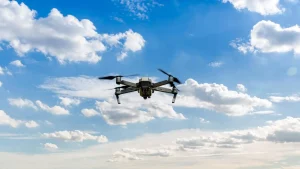Rajasthan – India embarks on a groundbreaking weather modification journey with the Rajasthan Drone Based Artificial Rain experiment launching today, marking the country’s first attempt at using unmanned aerial vehicles for cloud seeding operations. This innovative Rajasthan Drone Based Artificial Rain project represents a significant technological advancement in agricultural water management and drought mitigation strategies.
The Rajasthan Drone Based Artificial Rain initiative demonstrates India’s commitment to exploring cutting-edge solutions for water scarcity challenges. By replacing traditional aircraft with drone technology, this experiment opens new possibilities for cost-effective and precise weather modification techniques across the subcontinent.
Inauguration Details and Official Launch

State Agriculture Minister Kirodi Lal Meena will officially inaugurate the Rajasthan Drone Based Artificial Rain project at 2 PM near Jaipur’s Ramgarh Dam. This ceremonial launch emphasizes the state government’s commitment to innovative agricultural solutions and water conservation efforts through advanced technological interventions.
The public inauguration of the Rajasthan Drone Based Artificial Rain experiment allows local residents to witness this historic moment in Indian meteorological science. The transparency of the launch event demonstrates confidence in the technology and its potential benefits for the region’s agricultural community.
Technical Implementation and Drone Deployment


Approximately 60 specialized drones will participate in the Rajasthan Drone Based Artificial Rain operations, representing a massive coordinated effort to modify weather patterns over targeted areas. These unmanned aerial vehicles will operate at high altitudes, carrying and dispersing chemical compounds designed to enhance cloud precipitation capabilities.
The Rajasthan Drone Based Artificial Rain system utilizes advanced drone technology capable of precise chemical delivery to cloud formations. This targeted approach offers superior control compared to traditional aircraft-based cloud seeding methods, allowing for more efficient and cost-effective weather modification operations.
Strategic Partnership and Technological Collaboration
The Rajasthan Drone Based Artificial Rain project emerges from collaboration between the Rajasthan Agriculture Department and GenX AI, a technology firm with operations in the United States and Bengaluru. This international partnership brings together local agricultural expertise with cutting-edge artificial intelligence and drone technology capabilities.
American scientists have contributed to the Rajasthan Drone Based Artificial Rain project development, providing technical expertise and validation for the cloud seeding methodology. This cross-cultural scientific collaboration ensures the experiment meets international standards for weather modification operations.
Regulatory Approvals and Official Clearances
The Rajasthan Drone Based Artificial Rain experiment has secured comprehensive regulatory approval from multiple government agencies, ensuring legal compliance and safety standards. The Directorate General of Civil Aviation (DGCA) has provided essential aviation clearances for high-altitude drone operations in designated airspace.
Additional approvals from the India Meteorological Department, district authorities, and the agriculture department demonstrate thorough governmental support for the Rajasthan Drone Based Artificial Rain initiative. These multi-agency clearances reflect the project’s significance and potential impact on regional water management strategies.
Postponement and Preparation Timeline
Originally scheduled for July 31, the Rajasthan Drone Based Artificial Rain experiment was postponed due to heavy rainfall alerts affecting the target region. This delay demonstrates responsible project management prioritizing safety and optimal conditions for successful cloud seeding operations.
Also Read: Trump China Tariffs: US President Extends Trade Deadline For Another 90 Days
Following the postponement, scientists conducted multiple preparatory trials in Jaipur to ensure complete readiness for the Rajasthan Drone Based Artificial Rain implementation. These preliminary tests validated equipment functionality and operational procedures before the official launch.
Cloud Seeding Science and Methodology
Cloud seeding represents a weather modification technique designed to enhance cloud precipitation capabilities through chemical intervention. The Rajasthan Drone Based Artificial Rain project employs silver iodide particles and other specialized chemicals to trigger water droplet formation within existing cloud structures.
The scientific principle behind cloud seeding involves providing nucleation sites for water vapor condensation, effectively giving clouds a catalyst for rain formation. The Rajasthan Drone Based Artificial Rain approach utilizes this established methodology through innovative drone-based delivery systems.
Effectiveness and Scientific Evidence

Research indicates that cloud seeding operations can increase rainfall by 5-15% under optimal atmospheric conditions. The Rajasthan Drone Based Artificial Rain project aims to achieve similar results while demonstrating the effectiveness of drone-based weather modification techniques in Indian climatic conditions.
A major Idaho project successfully demonstrated silver iodide’s effectiveness in increasing snowfall from super-cooled clouds, providing scientific precedent for the Rajasthan Drone Based Artificial Rain experiment. However, effectiveness varies significantly based on atmospheric conditions and existing cloud formations.
Limitations and Realistic Expectations
The Rajasthan Drone Based Artificial Rain experiment acknowledges that cloud seeding requires existing cloud formations to achieve results. The technology cannot create rain from clear skies but enhances precipitation potential from suitable atmospheric conditions.
Scientific studies suggest cloud seeding effectiveness ranges from 0% to 20% depending on various factors including cloud type, atmospheric conditions, and chemical delivery precision. The Rajasthan Drone Based Artificial Rain project will contribute valuable data to this ongoing scientific understanding.
Future Implications for Indian Agriculture

Success of the Rajasthan Drone Based Artificial Rain experiment could revolutionize drought management and agricultural water security across India. This pilot project may establish precedents for nationwide weather modification programs supporting food security and rural development initiatives.
The Rajasthan Drone Based Artificial Rain initiative represents India’s entry into modern weather modification technology, potentially inspiring similar projects in other drought-prone regions. The combination of traditional agricultural knowledge with advanced drone technology exemplifies India’s approach to sustainable development through technological innovation.

